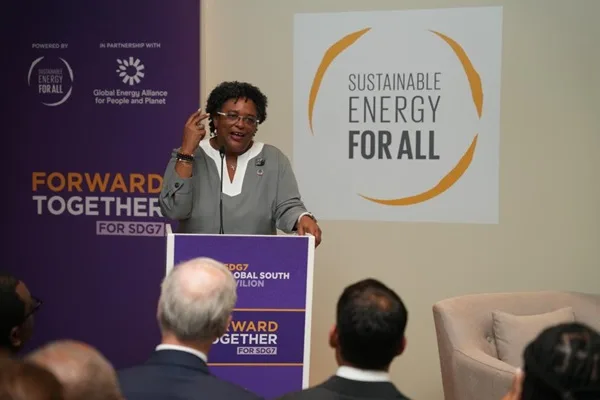Battery Energy Storage Systems Consortium Gathers Momentum at COP28
The Battery Energy Storage Systems (BESS) Consortium is a multistakeholder partnership initiated by Global Energy Alliance for People and Planet (GEAPP) and backed by the Global Leadership Council (GLC). One of the common objectives is to increase energy storage to at least 5 GW before the end of 2024. In turn, it is hoped this will boost the uptake of renewable energy to reach 400 GW of capacity by 2030.
“Malawi is committed to maintaining a renewable energy generation pathway for a sustainable future – and it’s projects like the BESS Consortium that will make our low carbon pathway a reality. We need more projects like that.”
Malawi President Dr Lazarus Chawera
The Global Leadership Council (GLC) is a high-level coalition of global leaders driven by a common motivation to accelerate the #EnergyTransition. It includes government representatives, corporate executives, representatives of MDB & DFI and NGO.
“Barbados is committed to playing a leading role in urging concrete deliverables on climate and climate financing. We are here with the BESS Consortium today because we support their efforts to improve access to battery energy storage systems as part of the energy transition in countries like ours.”
Barbados PM Mia Mottley

During a special event organized by the BESS Consortium at COP28 in Dubai on Monday 4 December 2023, nine African countries expressed interest to join the group to work towards the common goal. The countries are Burkina Faso, Egypt, Ghana, Kenya, Malawi, Mauritania, Mozambique, Nigeria and Togo.
In addition to the African countries, India, Indonesia and Vietnam were all very interested.
The Consortium also has as Resource Partners the African Development Bank (AfDB), the Asian Development Bank (ADB), the World Bank WB), the Inter-Amercian Development Bank (IADB), the Agence Francaise de Developpement (AFD), Africa50 and Masdar.
”The GLC initiatives such as the groundbreaking BESS Consortium are driving real and actionable progress. We are determined to deliver scalable solutions and measurable outcomes at speed by the time world leaders reconvene at COP29 next year.”
GEAPP VP Joseph Nganga
The role of the Resource Partners is to assist in Project Preparation, improve regulatory environment and unlock both public and private investment in order to promote renewable energy. AfDB President Dr Akinwumi Adesina highlighted the synergies between the BESS Consortium and the AfDB’s flagship Desert to Power Initiative.
“The African Development Bank is proud to be at the forefront of this transformative journey, leveraging strategic partnerships and financial commitments to drive progress. As we move forward, let us remain steadfast in our dedication to a cleaner, greener, and more prosperous Africa—one powered by the limitless potential of renewable energy and the resilience of the African spirit. Together, we can light up and power Africa for generations to come.”
AfDB President Dr Akinwumi Adesina
In conclusion, the co-chair of the Global Leadership Council Dr Rajiv Shah highlighted that without sufficient storage capacity, we will not be able to make renewable energy go mainstream due to its intermittent nature and dependency on weather conditions. Africa is welcome on board as it is where many of the #CriticalMinerals for lithium batteries needed for #EV and wind turbines can be found.
In order to attain the UN #SDG 7, the Consortium recalled that at least 400 GW of renewable energy projects must come online by 2030 along with at least energy storage for at least 90 GW.

